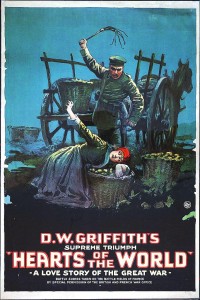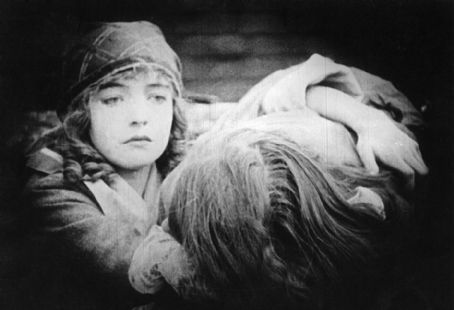“The Allies with fire and flame and souls of men win back inch by inch the sacred soil of France, righting her wrongs.”
|

Synopsis:
An American girl (Lillian Gish) living in France falls in love with the American boy (Robert Harron) living next door; but before they can marry, he goes off to fight against the Germans in World War I.
|
|
Genres, Themes, Actors, and Directors:
- D.W. Griffith Films
- Lillian Gish Films
- Romance
- Silent Films
- World War I
Review:
D.W. Griffith’s follow-up to Intolerance (1916) was this patently propagandist wartime melodrama, designed to encourage Americans to assist the British in fighting the Great War (though by the time the film was released, Americans were already squarely involved). The story itself is little more than a crutch upon which Griffith hangs his admittedly impressive footage of battles and the wartime havoc wreaked upon nearby villagers — but viewers will likely find themselves struggling to stay engaged overall. A minor subplot involving a vamp (Dorothy Gish) who tries to steal the affections of Lillian Gish’s betrothed doesn’t really go anywhere; the bulk of the film is concerned with following Harron as he struggles to survive a near-fatal skirmish, then goes undercover as a spy, while Lillian pines for her presumed-dead lover and must defend her virtue against Evil Germans. Check out TCM’s article to read more on the inception and production of this film, which is worth a look for historical purposes but not all-around must-see viewing.
Redeeming Qualities and Moments:
- A powerful early depiction of the ravages of World War I

Must See?
No; this one is only must-see for Griffith completists.
Links:
|


One thought on “Hearts of the World (1918)”
First viewing. Yes, for Griffith completists only.
A Griffith film is not a particularly easy viewing experience – but I’ve had easier times with them than this one. The remark “struggling to stay engaged overall” pretty much sums up this experience for me.
Though one recognizes the film’s admirable ambition (Griffith always preferred making ‘big, important’ films), overall it’s a rather clumsy affair (largely in terms of the direction). It has a rather choppy look to it (the editing is often awkward). The acting leans toward the crude and melodramatic. (This is perhaps Lillian Gish’s least memorable performance for this director.)
There is some genuine power in some of the battle sequences. But the film never seems to reach a firm footing.